College News
New biofuels degree program opens at CCCC
Notice: This article is older than 12 months. Names, contact information, programs, titles, etc. might have changed. If you have any problems please call the main college number, 1-800-682-8353, and we will be happy to direct you accordingly.
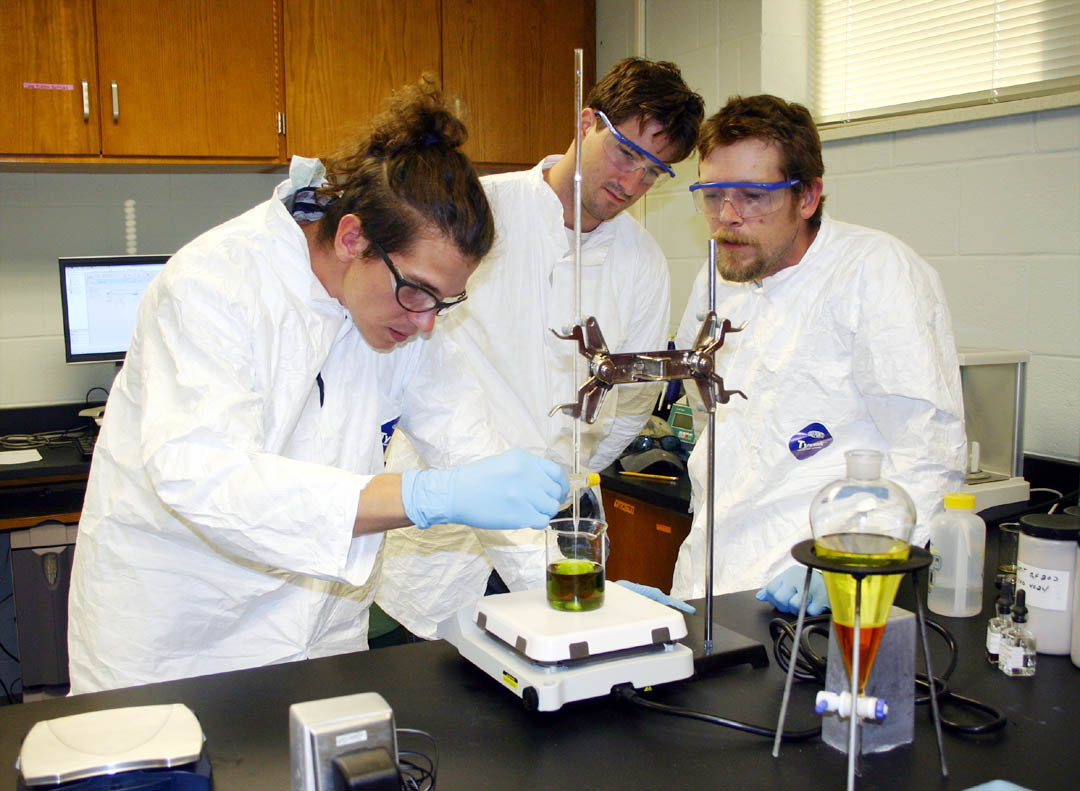
click image to enlarge ⊗
P.J. Bordelon (left), a student in Central Carolina Community College’s new Alternative Energy ... (more)
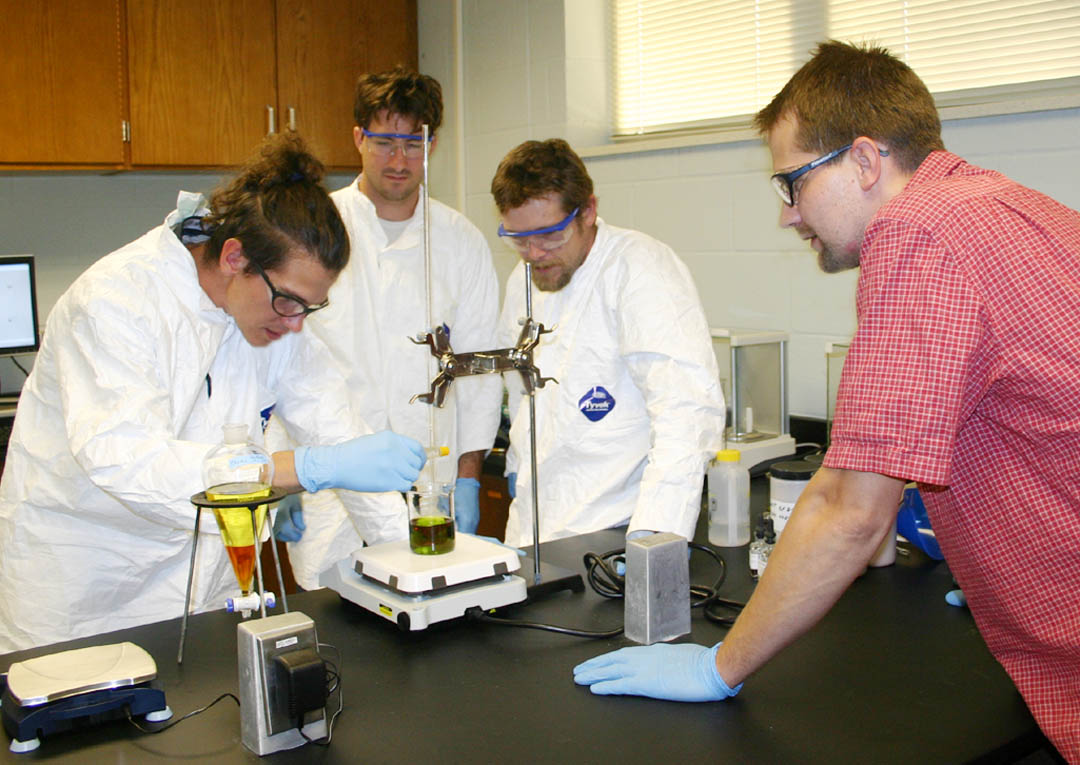
click image to enlarge ⊗
P.J. Bordelon (left), a student in Central Carolina Community College’s new Alternative Energy ... (more)
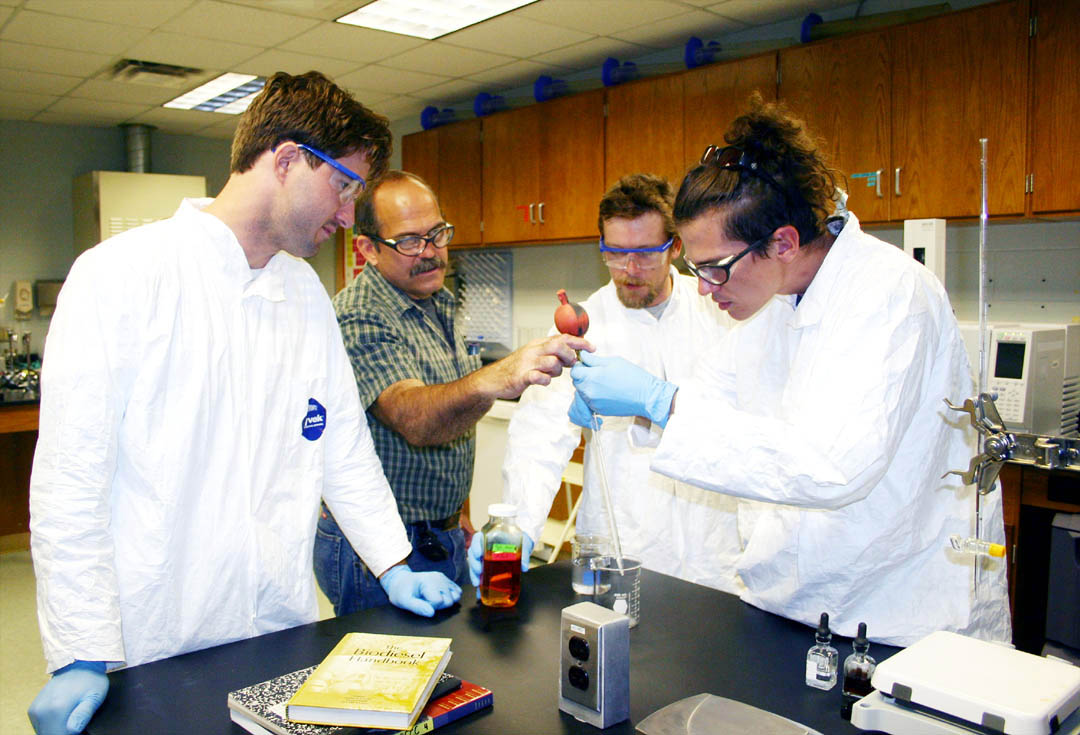
click image to enlarge ⊗
Bob Armantrout (second from left), of Moncure, adjunct instructor for Central Carolina Community College’s ... (more)
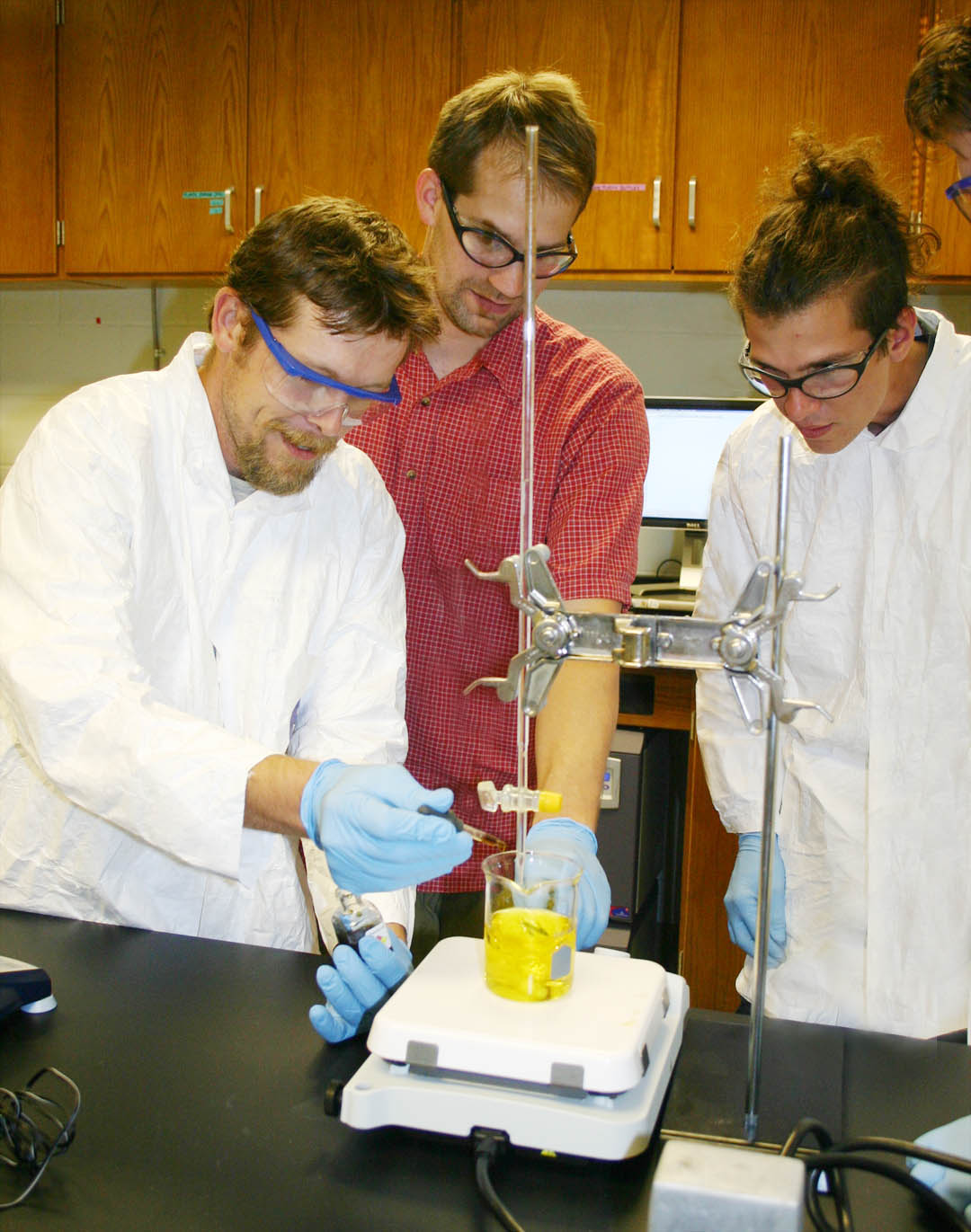
click image to enlarge ⊗
Will Mitchell (left), of Chapel Hill, a student in Central Carolina Community College’s new ... (more)
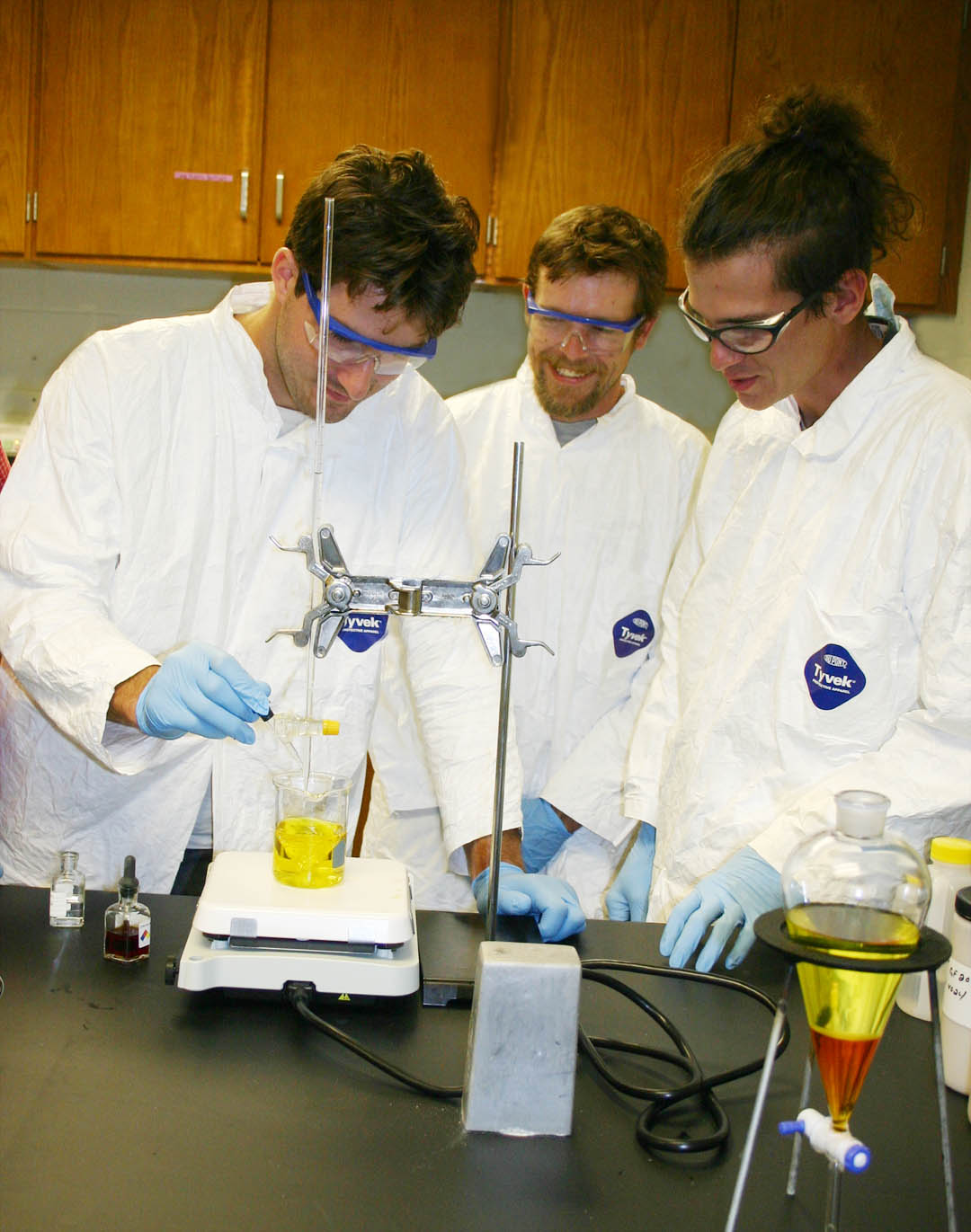
click image to enlarge ⊗
Pierce Coleman Cassedy (left) of Chatham County, a student in Central Carolina Community College’s ... (more)
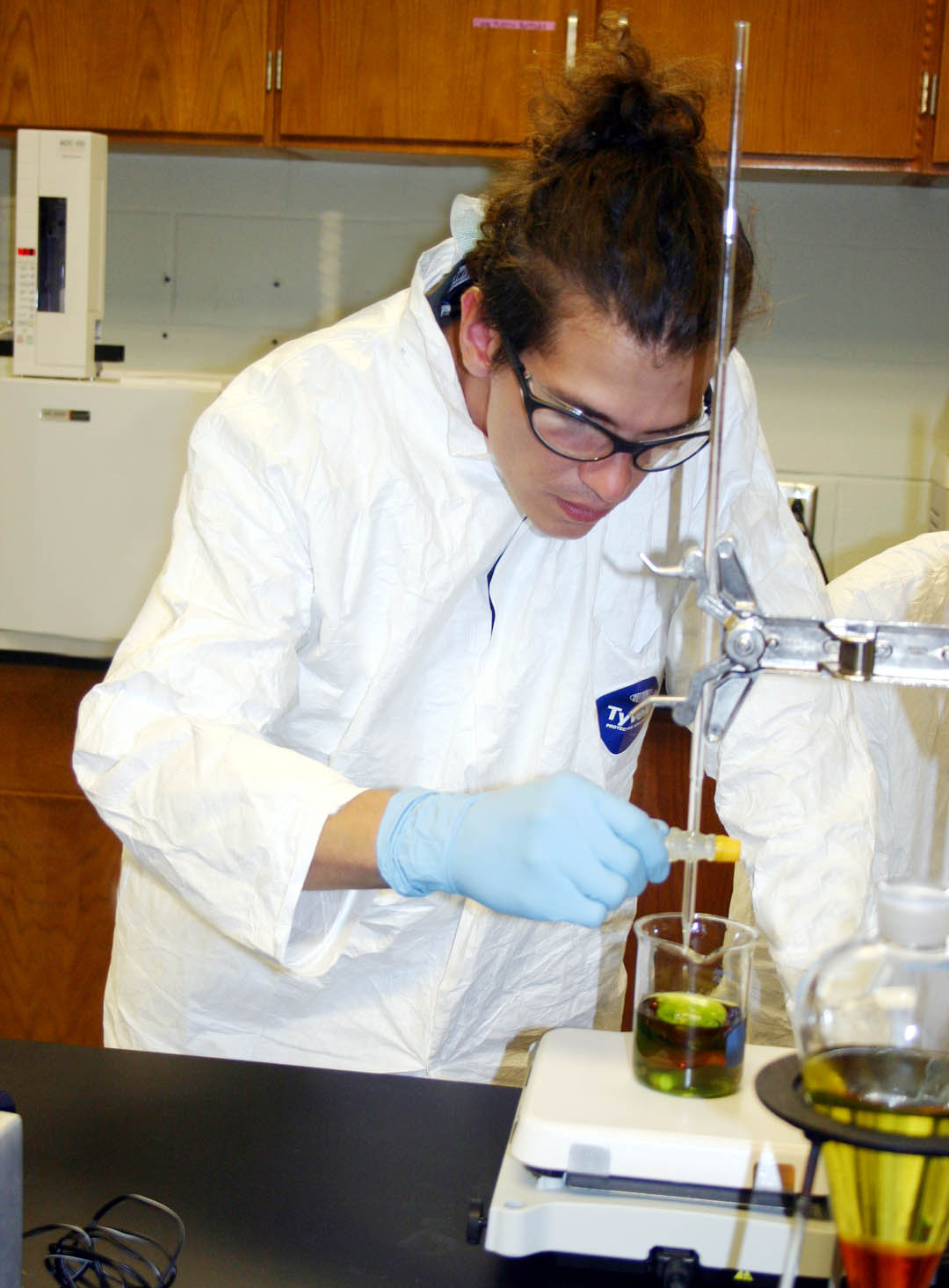
click image to enlarge ⊗
P.J. Bordelon, a student in Central Carolina Community College’s new Alternative Energy Technology: ... (more)
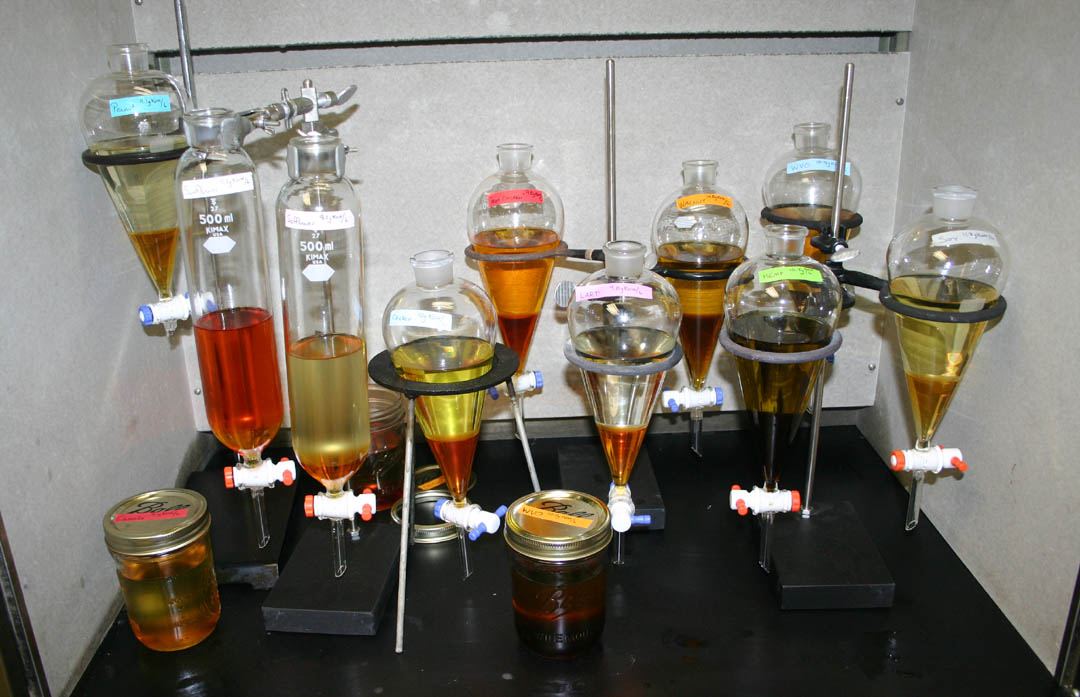
click image to enlarge ⊗
Students in Central Carolina Community College’s new Alternative Energy Technology: Biofuels ... (more)
11.04.2008 • Curriculum Programs
PITTSBORO — P.J. Bordelon, fuel distribution manager for Piedmont Biofuels, in Pittsboro, and Will Mitchell, of Chapel Hill, who’s thinking of becoming a farmer, don’t seem to have much in common.
But get them talking about Central Carolina Community College’s new Alternative Energy Technology: Biofuels associate degree program and they’re equally enthusiastic.
“I’ve been working on a degree in renewable and sustainable resources and I’m here to learn,” said Bordelon. “Taking the college’s program makes me more important as an employee for Piedmont.”
Mitchell speaks fondly of a 1,000-acre farm in Georgia that’s been in his family for eight generations. In addition to the biofuels training, he is finishing up a degree at the college in sustainable agriculture. Mitchell is also a graduate of the college’s REAL (Rural Entrepreneurship through Action Learning), a program that prepares people to successfully open and operate their own small businesses.
“I’d like to go to the family farm and use my sustainable agriculture training to become a grower and farmer,” he said. “I can use my biofuels degree to produce energy for on-farm use and, possibly, off-site sales. With the training I’m getting, I could also get a job in the biofuels industry.”
Industry, agriculture, small business — biofuels lead in all those directions, according to Andrew McMahan, Central Carolina C.C.’s biofuels program coordinator.
“Biofuels are growing,” he said. “It needs the well-trained workforce our new program will provide. With a biofuels degree, graduates will qualify for positions such as plant technician, plant manager, lab technician, sales manager, process coordinator, or business owner. Some of our graduates will want to start their own businesses.”
The college has offered biofuels classes through its Continuing Education program since 2002, when Rachel Burton, who became a co-founder of Piedmont Biofuels, in Pittsboro, began teaching it. Interest was high. With an eye on the workforce needs of the growing biofuels industry, the college requested — and received — approval from the North Carolina Community College System to offer a degree program.
In 2006, McMahan was hired by the college to develop the program. He worked closely with an advisory committee of professionals from the biofuels industry and agriculture in determining what knowledge and skills were needed, whether as workers employed in industry, agriculturists, or running a small biofuels business.
The first curriculum classes started in the fall 2008 semester and the five-semester program will graduate its first class in spring 2010. Currently, there are nine full-time students and several part-time students in classes taught by McMahan and adjunct instructor Bob Armantrout, of Moncure. Armantrout was vice president of production for Biodiesel Industries, in Colorado, before moving to North Carolina in 2007.
The biofuels degree curriculum includes biofuels analytics, biofuels waste management, bioprocessing practices, chemistry, math, and renewable energy technology. Its interdisciplinary approach also requires students to take courses in electrical control systems, welding, pumps and piping systems, and small business development.
“We are unique in the community college system, being the only college to offer an Alternative Energy Technology: Biofuels Associate in Applied Science degree,” McMahan said. “Our program is unique in the state because even the university-level biofuels programs don’t have the workforce training we offer. Also, if our graduates want to, they can continue on to a university and get a bachelor’s degree in engineering with a concentration in biofuels.”
Planning for the biofuels program was funded by a $58,000 grant from the NCCCS’s BioNetwork Center. The curriculum developed serves as a program template that will be shared with other community colleges through the Center. The program and lab were established almost totally with grant funding: about $140,000 from the BioNetwork Center; $195,000 from the Biofuels Center of North Carolina; and $50,000 each from the General Assembly and State Energy Office.
According to energy analysts, biofuels are poised to become a major energy source in the near future. The recent turmoil in the oil markets has only accelerated interest in them. Biofuels offer the advantages of being renewable and locally produced — which creates jobs in local economies and decreases dependency on foreign oil. They also give off little or no pollution, unlike oil and coal.
A study by the National Biodiesel Board states that by 2015 the biofuels industry will create 39,000 new jobs and add $24 billion to the U.S. economy. In North Carolina, a number of production facilities have opened in the past three years, and more are in the development stage.
“North Carolina has made a commitment to actively encourage biofuels production through the NC Biofuels Center and other initiatives,” said Dr. Karen Allen, the college’s provost for Chatham County programs. “At Central Carolina, we’re excited about the opportunity to play such an important part in workforce development for the new and rapidly expanding biofuels processing industry.”
Central Carolina C.C.’s program trains students to work in the three main areas of biofuels: biodiesel, made primarily from vegetable oils; ethanol, made primarily from corn; and biomass, made from grasses, landfill, hog waste, etc. They create and test the fuels on modern equipment in the lab, including a gas chromatograph and those that test for moisture and oxidative stability of the fuel.
“Central Carolina Community College has taken the lead and shone up the bigger universities in the development program for what I consider the frontier for sustainable future,” said Marc Dreyfors, owner of Carolina Biofuels, in Durham. “The program is attracting high quality students. We have one working for us and I hope he’ll stay.”
In the future, the program will be housed in a $3.8 million, 18,000-square-foot Sustainable Technologies Classroom and Lab Building on the Chatham Campus, along with the sustainable agriculture and green building programs.
To learn more about CCCC’s biofuels degree program, contact McMahan at (919) 542-6495, ext. 214, or by email at amcmahan@cccc.edu, or visit the college’s website at www.cccc.edu/biofuels. More information about the statewide life science community college initiative, BioNetwork, can be found at www.ncbionetwork.org.
Categories
- Admin, Faculty & Staff Category
- Arts & Entertainment Category
- Clubs Category
- College & Community Category
- College General Category
- Continuing Education Category
- Curriculum Programs Category
- Distance Education Programs Category
- Facilities/Buildings Category
- Finances Category
- Foundation Category
- Graduations Category
- Lee Early College Category
- NCCCS Category
- SGA Category
- Special Events Category
- Sports Category
- Students/Graduates Category
- Uncategorized Category
Archives

